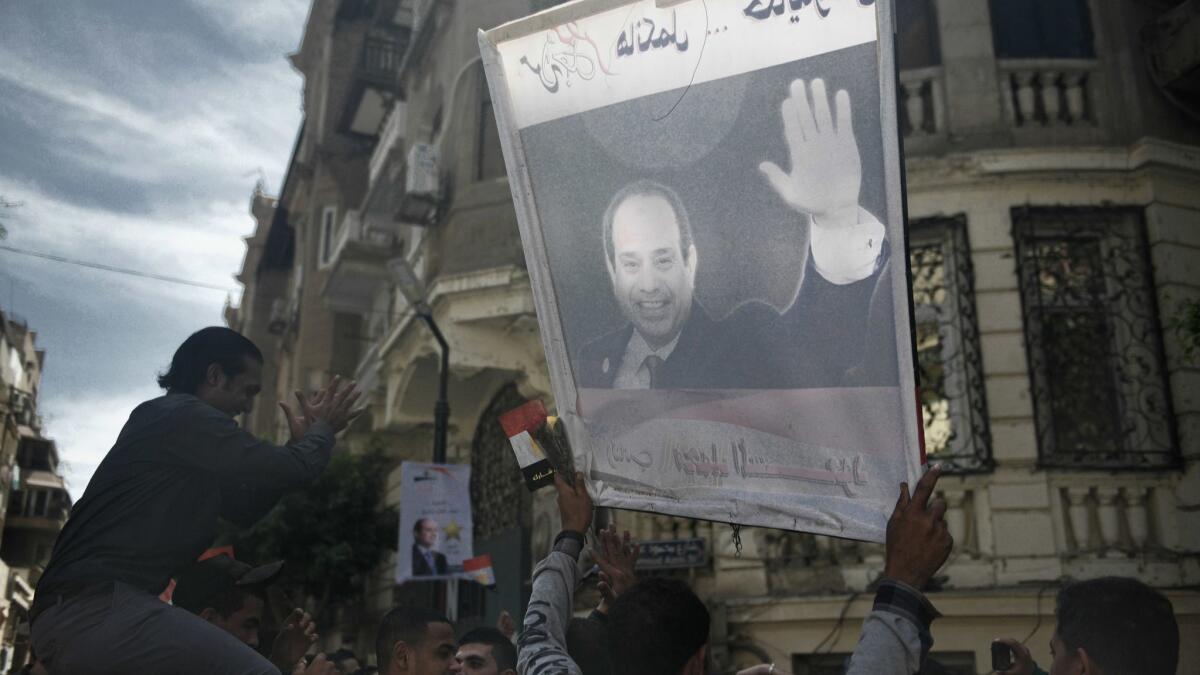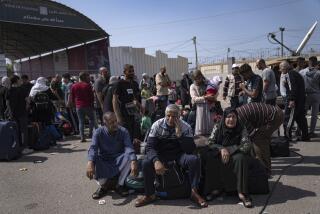Egypt’s President Sisi headed for landslide victory in election decried by critics as a farce

- Share via
Reporting from Cairo — In a result that was never in doubt, Egyptian President Abdel Fattah Sisi appears headed to a second term at the helm of the Arab world’s most populous nation after any serious challengers were prevented from running against him.
The resounding election victory — in which Sisi garnered more than 90% of the vote, according to unofficial tallies published Thursday by state-run media — was dampened by a lower turnout than four years ago.
Sisi’s lone opponent — Moussa Mostafa Moussa, an ardent supporter of the president whose last-minute candidacy was widely seen as an attempt to give the election a veneer of legitimacy — was reported to have received about 3% of the ballots cast over three days this week.
Official results are expected Monday. But Moussa conceded his likely defeat shortly after polls closed Wednesday, telling a local television station,“I am very happy with the experience, whatever the result.”
The government and its supporters made a concerted effort to entice and coerce voters to the polls to achieve a turnout that would shore up Sisi’s mandate in the face of critics who labeled the election a farce.
Some voters told local reporters they were promised boxes of food, small cash payments and other inducements to take part.
Officials in some governorates — the Egyptian equivalent of states — pledged to prioritize towns with high turnouts for upgrades to services such as water and sanitation, according to news reports. In another governorate, residents were told they could take part in a raffle for free religious pilgrimages to the Muslim holy city of Mecca in Saudi Arabia if local turnout reached 40%.
Voting is a legal requirement in Egypt, and the National Election Authority on Wednesday reminded citizens who did not take part that they could face fines of about $30. That would be a considerable sum for many here, although such fines have not been enforced in the past.
There were also reports of employers threatening to dock pay from their workers or report their names to the authorities if they didn’t vote. Voting was extended by an hour Wednesday to give people a final chance to cast ballots.
The state-run newspaper Al Ahram reported on its website Thursday that about 25 million of the country’s nearly 60 million eligible voters, or 42%, cast ballots. The official turnout in 2014 was more than 47%, though analysts questioned the accuracy of both figures based on the short or nonexistent lines observed at many polling stations.
Sisi was leading with about 92% of the vote, the newspaper said without specifying the number of ballots counted. The votes for Moussa were outnumbered by invalid ballots, according to figures provided by another daily, Al Youm Al Sabea .
In a tweet late Wednesday, Sisi said: “The scenes of Egyptians at polling stations will remain my source of pride and honor and a compelling proof of the greatness of our nation.”
“The voice of the Egyptian masses will undoubtedly remain a witness that the will of our nation is imposing itself with a force that knows no weakness,” he added.
Many Egyptians see the president as a bulwark of stability after years of political and economic turbulence after the 2011 “Arab Spring” uprisings that swept the region and toppled the country’s longtime strongman, Hosni Mubarak. Sisi, a former military chief, seized power in 2013 amid massive street protests against the country’s first democratically elected president, the Islamist Mohamed Morsi.
“People are so tired,” said Massoud Shafiq, a 50-year-old Cairo hairdresser who recalled a time when he could not run his blow-dryer because of constant power outages and didn’t feel safe in the streets after dark.
With Sisi in charge, he believes that the country’s problems are finally being addressed. “We want to see a continuation of what we have seen for the past four years,” he said.
To Sisi’s critics, however, this week’s vote was a meaningless referendum on the president’s rule. Any serious challengers were arrested or intimidated into withdrawing from the race.
“There is no election,” declared a 28-year-old Cairo street vendor, who said he didn’t bother to vote. “Sisi was going to win anyway.”
He did not want his name published in case of retribution.
Analysts said Sisi appeared to have decided that any political opening could lead to the kind of popular upheaval that toppled Mubarak. Sisi’s predecessor, Morsi, is in jail along with thousands of his followers from the Islamist Muslim Brotherhood. Hundreds of websites deemed critical of the government have been blocked, and journalists arrested or deported.
Khaled Dawoud, leader of the liberal Dostour party and a noted critic of Sisi, said he did not expect any reprieve now that the president has secured a second term.
“We are going to get four more years of the same, if not worse,” he said.
Though Sisi has said he has no intention of running again, many of his critics expect supporters to begin pressing for constitutional amendments that would allow the president to remain in office beyond the current two-term limit.
“His pattern to date does not show that he will be enthusiastic about simply stepping down and handing over to someone he doesn’t view as sufficiently fit for the task,” said H.A. Hellyer, a nonresident fellow at the Atlantic Council, a Washington think tank. “So either he will find someone whom he can groom, or he will want to extend his time.”
“Whether that is for one term or multiple terms, it’s unclear — but I think that will be a discussion fairly soon in his second term,” Hellyer added.
Experts warned, however, that even the government’s most ardent supporters will be looking to Sisi to provide relief from painful austerity measures required to secure a $12-billion loan from the International Monetary Fund. Although there are signs that the economy is improving, soaring prices and the elimination of subsidies have hurt many Egyptians.
Most seem to have accepted the argument that short-term pain is a necessary price to pay for long-term economic gain, “but their patience may not be infinite,” said Amy Hawthorne, deputy director of research at the Project on Middle East Democracy, a Washington think tank.
Sisi will also have to contend with Islamist extremists, including a group known as Sinai Province, an affiliate of Islamic State based in the Sinai Peninsula that has staged deadly attacks.
“So far I think they’ve been managed or contained and haven’t spread,” Hawthorne said. But she said recent attacks on churches in major cities of mainland Egypt could be “warning signs” that some groups are seeking to expand their presence into more heavily populated areas.
Analysts also point to another potential threat: a massive hydroelectric dam Ethiopia is building on the Nile River.
The Grand Ethiopian Renaissance Dam, expected to be completed this year, has become a point of contention among Ethiopia, Sudan and Egypt, which gets 90% of its water supply from the Nile.
Egypt is already facing water shortages blamed in part on the effects of climate change and a burgeoning population. The government fears that Ethiopia’s dam will reduce the flow to Egypt — a concern that the Ethiopian government says is misplaced.
Special correspondent Islam reported from Cairo and staff writer Zavis from Beirut.
Twitter: @alexzavis
More to Read
Sign up for Essential California
The most important California stories and recommendations in your inbox every morning.
You may occasionally receive promotional content from the Los Angeles Times.










